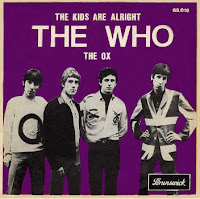
For example, the word "alright." When I critiqued a friend's manuscript for the first time, I confidently drew a big circle around the word in red--because of course the correct term was "all right." As far as I knew, "alright" wasn't even a word, just a misspelling.
Sure, The Who sang "The Kids Are Alright" as far back as 1965, but they were The Who. They could pretty much spell things however they wanted.
I was pretty much the guy writing to the newspaper in this comic:
Then my friend pointed out that many dictionaries now include "alright" as an acceptable spelling of the word. Merriam-Webster even goes so far as to say, "It is quite common in fictional dialogue, and is used occasionally in other writing."
After my initial reaction (betrayal! Merriam-Webster, how could you?) had died down, I got to thinking about the shifting nature of what I had always thought were iron-clad rules. I read several excellent articles on the subject, most of which pointed out the obvious: languages evolve. We don't spell things the same way or use the same grammar and punctuation rules as we did two hundred years ago, so why should we expect things to remain static now?
Another rule I had to wrap my head around was the slow phasing-out of my beloved Oxford comma. I used to argue it was necessary in all cases. I would point to absurdities like this:
But the real, honest truth of the matter is that almost every sentence makes sense without it. That doesn't mean I won't keep using it in all cases--it avoids ambiguity, and frankly I just think it makes the sentence look nicer and more balanced--but there's room for other opinions.
Another rude awakening for me was the modern publishing convention to use only one space after a period instead of two. When I learned to touch-type in middle school the satisfying "thwack thwack!" of the double space was an essential part of the rhythm.
 But this one is more open and shut: the publishing industry has come down on the side of only one space between sentences. Just about any reference you check agrees that in the post-typewriter and monospaced fonts era, there isn't any need to use two spaces after a period--and your published book almost certainly won't.
But this one is more open and shut: the publishing industry has come down on the side of only one space between sentences. Just about any reference you check agrees that in the post-typewriter and monospaced fonts era, there isn't any need to use two spaces after a period--and your published book almost certainly won't.
Changing habits of many years isn't easy. I don't think I could ever write "alright" in a manuscript, and I'm going to keep using the Oxford comma... but I've embraced one period after a sentence. I'm also working on being more accepting (or, to put it another way, not instantly judgmental) of those who choose to move with the times.



I can so relate! I've actually found it easier to type the newfangled "alright" than to not type the second space at a sentence's conclusion. People can say what they like about that second space not being needed, but I still find it helpful and easier on my aging eyes, proportional fonts notwithstanding.
ReplyDeleteHa--yeah, the one-space thing was definitely a learning curve. It helps that most modern books use only one space, though. Eventually it starts to look right.
DeleteI can't get behind ditching the Oxford comma. I once worked for a grammar-Nazi with an English PhD, and my first question was "Do you support the Oxford comma?" When he said yes, I knew we could work together. :)
ReplyDeleteGood call :-)
DeleteThe worst is when you know someone who's a fellow grammar Nazi but is vehemently OPPOSED to those very things you feel strongly about. I've had some seriously heated discussions with those kinds of people...
Soak feet to relieve physical fatigue, and start to relax from the feet. NIKSA foot massager also has massage stones, which can realize foot massage and relaxation at home, which is efficient and saves money.
ReplyDelete